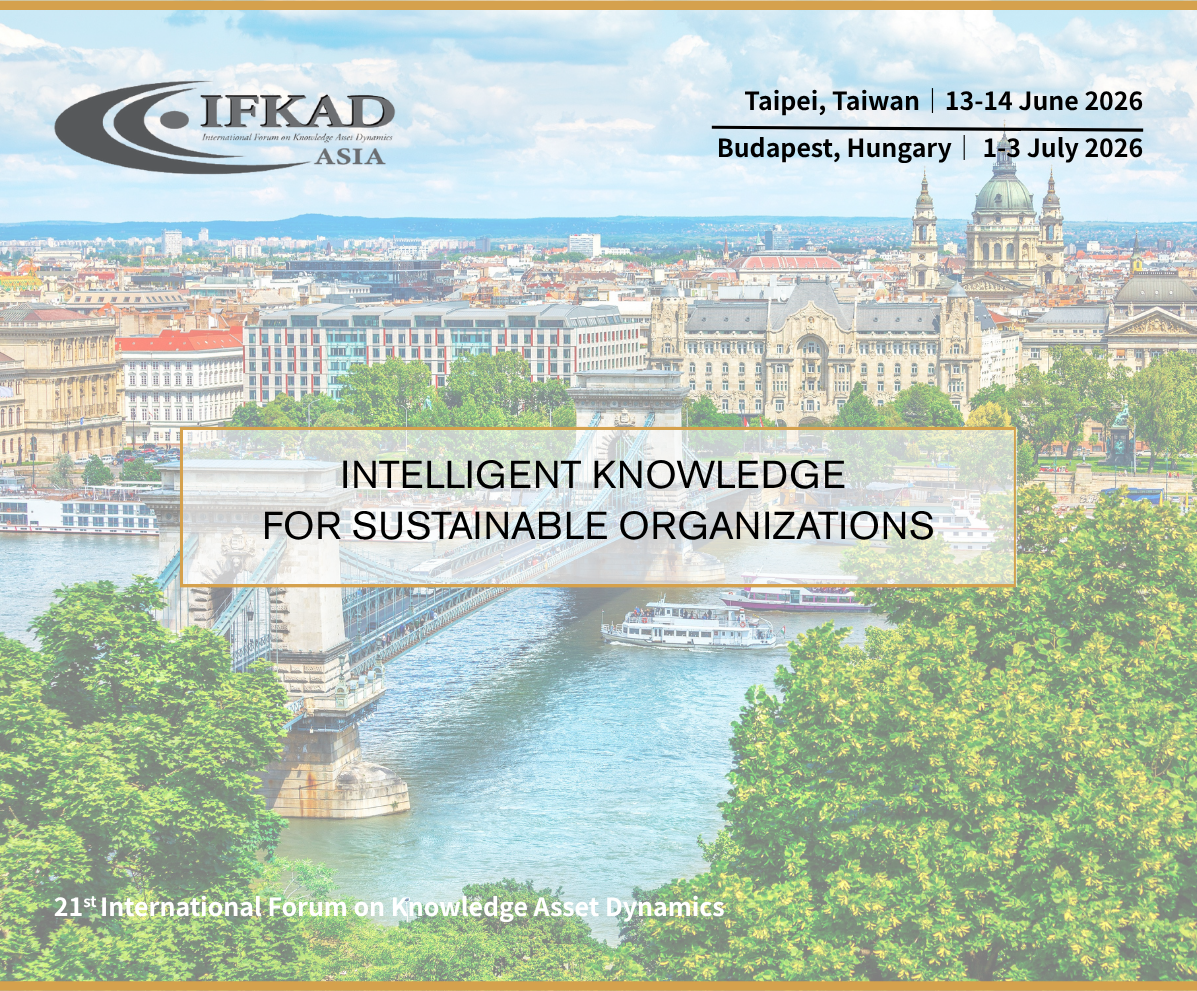- 會議主題:Intelligent Knowledge for Sustainable Organizations
- 全球官網及其他主題請參考:https://www.ifkad.org
- 第21屆 IFKAD Conference 國際學術研討會全球場次將於2026年7月1-3日在Budapest, Hungary舉行,亞洲場次6月13-14日在臺灣臺北舉行學術論文發表(會議地點為國立政治大學)。
- IFKAD Conference會議地點:Corvinius University of Budapest, Hungary
- IFKAD ASIA Chapter會議地點:National Chengchi University, Taipei City, Taiwan
- 會議優秀論文可推薦投稿至國際期刊:
- IFKAD ASIA Chapter議程詳見官網:
徵稿啟事
The convergence of Knowledge Management (KM) and Artificial Intelligence (AI) is transforming how organizations generate, share, and apply knowledge to pursue sustainability. At the heart of this transformation lies the concept of intelligent knowledge: systems that dynamically combine human cognitive capacities with advanced AI-based tools to foster ethical, inclusive, and purpose-driven innovation.
In a time of ecological, social, economic, and technological upheaval, organizations must innovate while meeting long-term sustainability goals such as the United Nations Sustainable Development Goals (SDGs) and Environmental, Social, and Governance (ESG) commitments. Intelligent knowledge offers a way to navigate this complexity by positioning AI not as a replacement for human thinking but as an enhancement — expanding analytical capacity while preserving human judgment, imagination, aesthetic experience, and values.
For decades, KM has addressed the challenges of systematically creating, storing, sharing, and applying knowledge within organizations. Traditional problems included how to capture and diffuse technical knowledge, how to bridge silos, and how to ensure that knowledge supports decision-making and innovation. Today, AI promises to solve some of these long-standing challenges by providing unprecedented computational power, automating processes, and enabling rapid access to vast knowledge repositories.
At the same time, new and pressing challenges are emerging. Organizations must now question what it truly means to create intelligent knowledge in an era dominated by digital technologies. How can they ensure the validity and reliability of AI-generated knowledge? How can they manage the ethical risks of algorithmic bias and automated decision-making? How can they preserve the richness of tacit, embodied, and emotional expertise that machines cannot codify? The task ahead is not only to adopt advanced technologies but also to re-imagine KM practices that cultivate hybrid knowledge ecosystems where human creativity, critical judgment, and relational intelligence work in synergy with AI’s computational power.
This shift calls for a new vision of KM: one that views knowledge not just as information to be stored, retrieved, and managed mainly by people, but as a dynamic capability integrating the capacity of both human and new digital systems, which enables organizations to adapt, learn, and thrive in complex environments. Intelligent knowledge thus becomes a cornerstone of organizational excellence, resilience, and sustainability.
IFKAD 2026 will offer an international platform to explore key frontier issues. The conference will promote dialogue on how intelligent knowledge can support sustainable innovation, organizational resilience, and responsible governance in the digital age. It encourages contributions that analyze the opportunities, challenges, and implications of AI-enabled knowledge systems for organizations, economies, and societies.
Also, IFKAD is primarily a scientific event that brings together academics. It aims to foster conversation and create a learning experience in which academics, practitioners, and policymakers discuss the role of intelligent knowledge in building sustainable future organizations. IFKAD 2026 will explore these urgent questions, advancing both theoretical understanding and practical insights. The conference will serve as a vibrant platform for co-creating knowledge to build intelligent, adaptive, and sustainable organizations that can flourish in an age of complexity.
重要日程(亞洲場次)
2026年01月23日 論文摘要投稿截止(應多方熱烈需求開放第二輪投稿至2/12止)
2026年02月26日 論文摘要錄取暨註冊費繳交通知
2026年04月15日 國際學術研討會Early-Bird Rate優惠註冊截止
2026年04月20日 論文全文曁簡報繳交截止
2026年05月20日 國際學術研討會註冊截止
2026年06月13日 2026 IFKAD ASIA Chapter 亞洲場次-國際學術研究論文發表會議(國立政治大學)
2026年06月14日 2026 IFKAD ASIA Chapter 亞洲場次-永續城鄉社會實踐參訪
2026年07月1-3日2026 IFKAD Conference 全球場次-國際學術研討會(Hungary)
Submission Guidelines
Deadline for abstract submission is 12 February 2026.
Participants who wish to present their research at the IFKAD 2026 conference are welcome to send an extended abstract in editable WORD FORMAT (.doc or .docx only) according to the following guidelines and using this ABSTRACT TEMPLATE.
All abstracts will undergo a double-blind peer review and review results will be communicated to authorsnot later than 26 February 2026.
Each abstract should include:
l title of the proposed article
l authors’ information (name, affiliation, address, email – separately for each author)
l abstract text of 500-1,000 words
l max 5 keywords
l paper type (Academic/Practical)
l bibliographical references
The word count is only related to the abstract text itself. Title, authors information, keywords and references are not taken in consideration for the abstract length requirement.
亞洲論文發表場次注意事項
- 經IFKAD ASIA Chapter報名投稿「IFKAD 知識資產與管理動態學國際學術研討會」,且論文獲研討會接受者,可擇一或同時於亞洲場次(6月13-14日)與全球場次(7月1-3日)發表。
- 請將摘要/全文投稿稿件 abstract template,以WORD檔案儲存,檔名為「IFKAD ASIA 2026+發表作者中文/英文姓名」,並以EMAIL附檔方式寄至forum@iilabs.org.tw,IFKAD ASIA Chapter秘書處收。
- 懇請閱讀上述提交摘要說明。
- 論文摘要稿件須接受審查,合格稿件將由電子郵件聯繫,請於期限內繳交註冊費及提供論文全文。
- 所有稿件需未曾在任何研討會或期刊發表。
- 所有被接受的論文將提交製作研討會摘要論文集。
- 為了安排發表和收錄論文集,必須由至少一位作者完成正式註冊,且需指定唯一的發表者(例如:同一位作者只能擔任一篇論文的發表人)。
若同一位作者有多篇論文被接受發表,則每篇論文都必須各自註冊並繳交相應的費用,才能列入大會議程。
IFKAD President
Giovanni Schiuma – LUM University, ITA
IFKAD ASIA President
Min-Ren Yan – National Chengchi University, TWN
IFKAD 2026 Conference Chairmen
Victoria Horvath - Corvinius University of Budapest, Hungary
Nikolett Deutsch - Corvinius University of Budapest, Hungary
聯絡資訊
IFKAD ASIA Chapter秘書處
連絡信箱:forum@iilabs.org.tw
Scientific Advisory Board Committee
Anand, Amitabh – SKEMA Business School, FRA
Bassi, Antonio – SUSPI, CHE
Bolisani, Ettore – University of Padua, ITA
Bontis, Nick – McMaster University, CAN
Bounfour, Ahmed – University of Paris XI – Paris-Sud, FRA
Bruno, Giuseppe – University of Naples Federico II, ITA
Campisi, Domenico – Tor Vergata University of Rome, ITA
Canonico, Paolo – University of Naples Federico II, ITA
Carrillo, Francisco – Tecnologico de Monterrey, MEX
Corvello, Vincenzo – University of Calabria, ITA
Demartini, Paola – University of Rome Tre, ITA
De Nito, Ernesto – University of Salerno, ITA
Dragomirescu, Horatiu – Bucharest University of Economic Studies, ROM
Durst, Susanne – Reykjavik University, IS
Edvinsson, Leif – UNIC Stockholm, SWE
Edvardsson, Ingi Runar – University of Iceland, ISL
Esposito, Emilio – University of Naples Federico II, ITA
Ferreira, João J. M. – University of Beira Interior, POR
Gavrilova, Tatiana – St.Petersburg State University, RUS
Grandinetti, Roberto – University of Padova, ITA
Guthrie, James – University of Sydney, AUS
Handzic, Meliha – International Burch University, BIH
Iazzolino, Gianpaolo – University of Calabria, ITA
Jarrar, Yasar – Open Data Institute, UAE
Jones, Paul – Swansea University, UK
Kianto, Aino – Lappeenranta University of Technology, FIN
Laihonen, Harri – University of Tampere, FIN
Lee, Rongbin W.B. – The Hong Kong Polytechnic University, CHN
Lev, Baruch – New York University, USA
Lewicka, Dagmara – AGH University of Science and Technology, POL
Liebowitz, Jay – University of Maryland, USA
Lönnqvist, Antti – University of Tampere, FIN
Martínez Raya, Antonio – Polytechnic University of Madrid, ESP
Martins, Blanca – Technical University of Catalonia, ESP
Miglietta, Pier Paolo – University of Salento, ITA
Min-Ren Yan – National Chengchi University, TWN
Mestre, Ana Cristina – Loughborough University London, UK
Molodchik, Mariia – National Research University Higher School of Economics, RUS
Morales-Alonso, Gustavo – Polytechnic University of Madrid, ESP
Moustaghfir, Karim – Al Akhawayn University, MAR
Neely, Andy – Cambridge University, UK
Noennig, Joeg Rainer – Dresden University of Technology, GER
Ordoñez de Pablos, Patricia – University of Oviedo, ESP
Paoloni, Paola – Sapienza University of Rome, ITA
Passerini, Katia – St.John’s University, USA
Reina, Rocco – University of Catanzaro, ITA
Reuther, Kevin – West Saxon University Zwickau, GER
Roos, Göran – VTT Technical Research Centre of Finland, FIN
Sanchéz, M. Paloma – Autonomous University of Madrid, ESP
Sanchéz Gutiérrez, José – University of Guadalajara, MEX
Scarso, Enrico – University of Padua, ITA
Schumann, Christian-Andreas – West Saxon University Zwickau, GER
Seetharam , Shanker – Centennial College, CAN
Spender, JC – Rutgers University, USA
Strazzullo, Serena – University of Naples Federico II, ITA
Sveiby, Karl-Erik – Hanken School of Economics, FIN
Tang, Yongli – Jinan University, CHN
Troise, Ciro – University of Turin, ITA
Tsui, Eric – Honk Kong Polytechnic University, HKG
Venkitachalam, Krishna – Ajman University, UAE
Viedma Marti, Jose Maria – Polytechnic University of Catalonia, ESP
Yigitcanlar, Tan – Queensland University of Technology, AUS
Publication Committee
Carlucci, Daniela – University of Basilicata, ITA
Laihonen, Harri – University of Tampere, FIN
Lerro, Antonio – University of Basilicata, ITA
Raimo, Nicola – LUM University, ITA
Secundo, Giusy – LUM University, ITA
Spender, JC – Rutgers University, USA
PhD Consortium Committee
Carlucci, Daniela – University of Basilicata, ITA
Citlally Torres, Gabriela –
Morales-Alonso, Gustavo – Polytechnic University of Madrid, ESP
Secundo, Giusy –
IFKAD Manager
Jaroš, Gabriela – Web & Knowledge Manager, CZE
Organizing Committee
Baldassarre, Silvia – University of Bergamo, ITA
Canonico, Paolo – University of Naples Federico II, ITA
Cavola, Manuel – Pegaso University, ITA
De Nito, Ernesto – University of Salerno, ITA
Del Vecchio, Pasquale – LUM University, ITA
Diglio, Antonio – University of Naples Federico II, ITA
Pipicelli, Eduardo – University of Naples Federico II, ITA
Primario, Simonetta – University of Naples Federico II, ITA
Santarsiero, Francesco – University of Basilicata, ITA
Organized by
Corvinus University of Budapest
Arts for Business Institute
iiLABs (industry+innovation Laboratories)
LUM University
National Chengchi University
Associated Partners
International Association for Knowledge Management
Institute of Knowledge Asset Management




